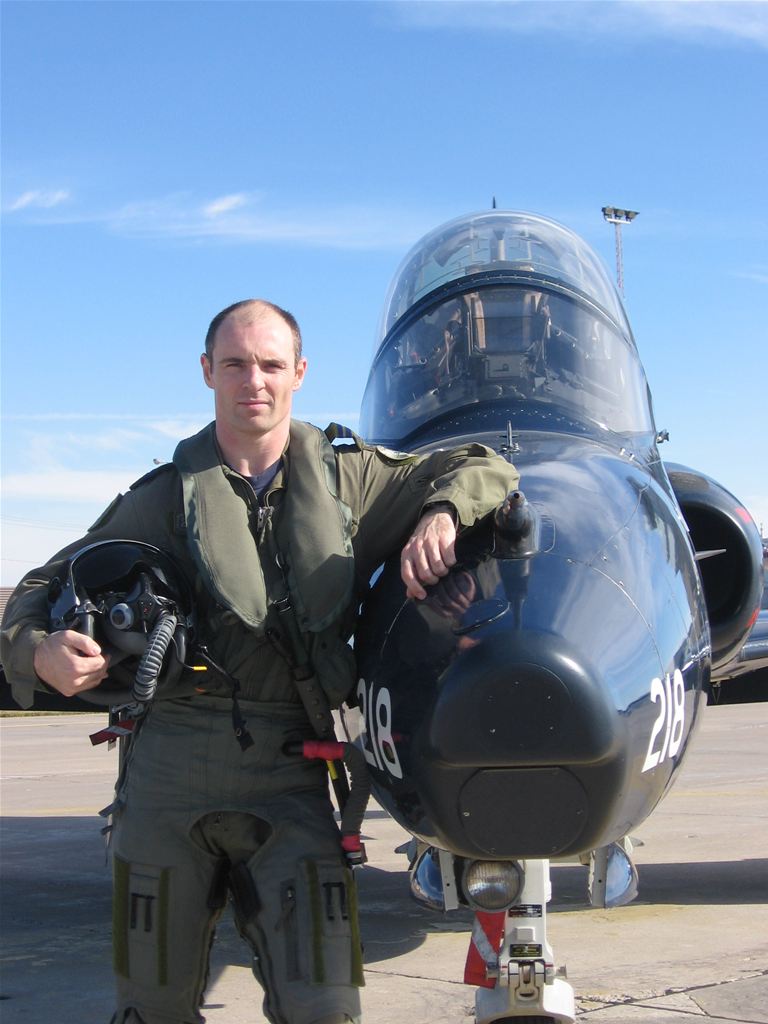Pilot gives up soaring above the clouds for Christ

The lines around Captain Bill Hodson’s shining brown eyes deepen. The corners of his mouth turn up—almost uncontrollably—as he talks about why he loves to fly.
His favourite thing is walking onto the base on a crisp, clear morning. The sun is bright and warm overhead in an azure sky, and the tarmac is quiet. The techs have prepared all the military aircraft for flight. They’re lined up in two perfect rows, waiting.
Pilots like him will see better than anyone else how God has put the clouds and the colours of the earth together that day.
“I just love being above the earth looking down,” Hodson says quietly, pensively. He smiles as he pictures it.
“You can see forever on a clear day.”
Cloudy days are no less majestic—pilots still get to see the sun.
During periods in his military career when he hasn’t flown, he admits he’s dreamed of taking an F-18 jet right off the base—that’s how much he loves being in the sky.
Hodson is a military flight instructor at 15-Wing, the Canadian Forces base outside of Moose Jaw, Sask.
After joining the military out of high school in the early 90s, Hodson completed a degree in mechanical engineering at Canada’s Royal Military College in Kingston. After graduation, he started his fighter pilot training in Portage La Prairie, Man., and finished it in Moose Jaw before accepting his first post in Cold Lake, Alta., in 1999.
Life was good.
Six years later, tragedy would alter Hodson’s course. His wife, Faye, died in a car accident in Cold Lake, leaving him and their two boys, who were one and three years old.
Hodson knew then his career as a fighter pilot was over—he needed a job that would allow him to stay home with his young sons.
He applied for a transfer to 15-Wing, and he and his boys moved to Caronport, Sask., to live with his late wife’s parents. He began a new career as a flight instructor.
Within a few years, the Lord shifted Hodson’s course again, blessing Hodson and his boys with a woman named Christine Chalmers. She and Hodson married in 2007.
God was good—so good. But Hodson was restless. Teaching young soldiers the takeoffs and landings he’d done so many times was rewarding, but repetitive. He needed to engage his mind.
Even before Hodson had become a Christian, he says, he was a “thinker”—he “liked to talk about the ideas of God and the origins of everything around us.”
Since becoming a Christian in 1999, just before his posting in Cold Lake, those conversations have taken on far greater significance for Hodson.
Walking with a solider to a place where he or she can think about God for the first time is amazing, he says. His love for the conversations with his fellow soldiers about life and God and faith have taken over even his love for flying. His colleagues call him “Thumper”—as in Bible-thumper.
And so, in 2008, after a great deal of prayer, he and his wife decided he would give it up. Nine years of service in the Canadian military gave him an opportunity to choose the next part of his career, so he decided to apply for chaplaincy.
He was accepted, and he enroled in Briercrest College and Seminary’s Master of Divinity program the same year.
He still works as a flight instructor—but he knows he’ll have to stop when he receives a chaplaincy posting in a few years.
It’s hard thinking about not flying, he admits.
Will it be worth it?
The well-used lines around Hodson’s eyes appear again. “Of course it will.”
Hodson explains how much more meaning his life has since becoming a Christian. His hope is that the young soldiers he works with will find the same meaning in their own lives. Hodson wants them to understand how important their work is to God—how important they are to God.
“It really bothers me to know how many people in the military are just working for the weekend,” he says. Eventually, if life goes their way, his co-workers will retire comfortably—but what will their lives be about?
Hodson loves what he’s learning at Briercrest about the Scriptures and pastoral care. For him, the fact that so many people miss out on the privilege of studying the Bible is a great loss.
He’s grateful for the community that took him and his young boys in five years ago. As the seminary student body’s appointed president this year, he gets to give a little back to the people who have cared so deeply for him.
“I wish more people would take advantage of this place,” he says.
